The True Story of the Four Chaplains
Chaplain George Fox
 George Fox was the foldest of the Four Chaplains. In Vermont, he was called "the little minister" because he was 5'7". Lying about his age in 1917, he enlisted in the Army as a medical corps assistant. He received the Silver Star for rescuing a wounded soldier from a battlefield filled with poison gas, although he wore no gas mask himself, and the Croix de Guerre for outstanding bravery in an artillery barrage that left him with a broken spine. After the war, he became a successful accountant. He was happily married with two children when he heard God's call to the ministry. Fox went back to school and later was ordained as a Methodist minister. When war came, he once again enlisted, telling his wife, "I've got to go. I know from experience what our boys are about to face. They need me." Before he boarded Dorchester, he wrote a letter to his daughter. "I want you to know," he wrote, "how proud I am that your marks in school are so high - but always remember that kindness and charity and courtesy are much more important."
George Fox was the foldest of the Four Chaplains. In Vermont, he was called "the little minister" because he was 5'7". Lying about his age in 1917, he enlisted in the Army as a medical corps assistant. He received the Silver Star for rescuing a wounded soldier from a battlefield filled with poison gas, although he wore no gas mask himself, and the Croix de Guerre for outstanding bravery in an artillery barrage that left him with a broken spine. After the war, he became a successful accountant. He was happily married with two children when he heard God's call to the ministry. Fox went back to school and later was ordained as a Methodist minister. When war came, he once again enlisted, telling his wife, "I've got to go. I know from experience what our boys are about to face. They need me." Before he boarded Dorchester, he wrote a letter to his daughter. "I want you to know," he wrote, "how proud I am that your marks in school are so high - but always remember that kindness and charity and courtesy are much more important."
Chaplain Alexander Goode
 Growing up in Washington, DC, Alexander Good was an outstanding athlete and scholor. Following in his father's footsteps, this young man - known fo rhis laughter and love of life - became a rabbi. Even as he pursued his studies, he found tiem to serve in the National Guard. The return of the body of the Unknown Soldier to Arlington National Cemetery had a profound effect on Goode. He attended the ceremonies, choosing to walk the 15 miles there and 15 miles back rather thatn take a car or a bus because he thought it showed more respect. Goode married his childhood sweetheart and they had a daughter. He was serving a synagogue in York, PA, when World War II broke out. One day, Mrs. Goode received a telegram from her husband that read, "Having a wonderful experience," and she knew that her husband had found companions with whom he could share his faith and good humor.
Growing up in Washington, DC, Alexander Good was an outstanding athlete and scholor. Following in his father's footsteps, this young man - known fo rhis laughter and love of life - became a rabbi. Even as he pursued his studies, he found tiem to serve in the National Guard. The return of the body of the Unknown Soldier to Arlington National Cemetery had a profound effect on Goode. He attended the ceremonies, choosing to walk the 15 miles there and 15 miles back rather thatn take a car or a bus because he thought it showed more respect. Goode married his childhood sweetheart and they had a daughter. He was serving a synagogue in York, PA, when World War II broke out. One day, Mrs. Goode received a telegram from her husband that read, "Having a wonderful experience," and she knew that her husband had found companions with whom he could share his faith and good humor.
Chaplain Clark Poling
 Clark Poling was the youngest of the Four Chaplains and the seventh generation in an unbroken line of ministers in the Dutch Reformed Church. When World War II broke out, he was anxious to go, but not as a chaplain. "I'm not going to hide behind the church in some safe office out of the firing line," he told his father. The elder Poling replied, "Don't you know that chaplains have the highest mortality rate of all? As a chaplain you'll have the best chance in the world of being killed. You just can't carry a gun to kill anyone yourself." So the young man left this pastorate in Schenectady, N.Y., and became and Army chaplain. Just before he saile, Poling asked hsi father to pray for him - "not for my safe return. That wouldn't be fair. Just pray that I shall do my duty... and have the strength, courage and understanging of men. Just pray that I shall be adequate." Indeed, he taught his men to not harbor personal hatred for the Germans and the Japanese. Hate the system that made your brother evil, he said. It is the system we must destroy.
Clark Poling was the youngest of the Four Chaplains and the seventh generation in an unbroken line of ministers in the Dutch Reformed Church. When World War II broke out, he was anxious to go, but not as a chaplain. "I'm not going to hide behind the church in some safe office out of the firing line," he told his father. The elder Poling replied, "Don't you know that chaplains have the highest mortality rate of all? As a chaplain you'll have the best chance in the world of being killed. You just can't carry a gun to kill anyone yourself." So the young man left this pastorate in Schenectady, N.Y., and became and Army chaplain. Just before he saile, Poling asked hsi father to pray for him - "not for my safe return. That wouldn't be fair. Just pray that I shall do my duty... and have the strength, courage and understanging of men. Just pray that I shall be adequate." Indeed, he taught his men to not harbor personal hatred for the Germans and the Japanese. Hate the system that made your brother evil, he said. It is the system we must destroy.
Chaplain John Washington
 John Washington grew up in the toughest section of Newark, N.J., poor, scrappy and determined. One of nine children born to an Irish immigrant family, he was blessed with a sunny disposition and a love for music. He also loved a good fight, and was a member of the South 12th Street gang when he was called to the priesthood. He played ball with the boys of the parish, organzed sports teams and, when the war broke out, went with his "boys" into the Army. Raised in song and prayer to comfort those around him, Washington's beautiful voice could be heard above the cries of the dying in his final moments on Feb. 3, 1943.
John Washington grew up in the toughest section of Newark, N.J., poor, scrappy and determined. One of nine children born to an Irish immigrant family, he was blessed with a sunny disposition and a love for music. He also loved a good fight, and was a member of the South 12th Street gang when he was called to the priesthood. He played ball with the boys of the parish, organzed sports teams and, when the war broke out, went with his "boys" into the Army. Raised in song and prayer to comfort those around him, Washington's beautiful voice could be heard above the cries of the dying in his final moments on Feb. 3, 1943.
Extra Notes:
Upon meeting a the Chaplains' school, the four men quickly became friends. One of Clark Poling's counsins later said, "They were all very sociable guys, who seemed to have initiated interfaith activities even before the war. They hit it off well at the Chaplains' school. Sharing their faith was not just a first-time deal for them. They were really very close. They had prayed together a number of times before that final crisis."
The observation of pointed out by Clark's cousin is of note, fo rhte men of who he spoke were unique. Their close bond might easily have marked them as "The Four Chaplains" long before a fateful night three months after they first met, when their actions would forever make the title synonymous with tthe names of George L. Fox, Alexander d.Goode, Clark V. Poling and John P. Washington. The difference in their backgrounds and personalities could have been easily outweighted by their common calling to ministry, had it not been for one major difference:
Reverend Fox was a Methodist Minister
Revered Poling was a Dutch Reformed Minister
Father Washington was a Catholic Priest
Rabbi Goode was Jewish
In a world where differences have all too often created conflict and separated brothers, the Four Chaplains found a special kind of unity, and in that unity they found strength. Despite the differences, they became "brothers" for they had one unseen characteristic in common that overshadowed everything else.
They were brothers because: They All Four Shared the Same Father!
"Four Chaplains Interfaith Memorial Service" Nassau County, Department of New York, collected the data on Feburary 7, 2023